VOICE for Class 9 ENGLISH
What is Voice?
Voice is the term used to describe whether a verb is active or passive.
वाच्य किसे कहते है ?
वाच्य शब्द का प्रयोग यह वर्णन करने के लिए किया जाता है कि कोई क्रिया सक्रिय (active) है या निष्क्रिय (passive)।
Types of Voices
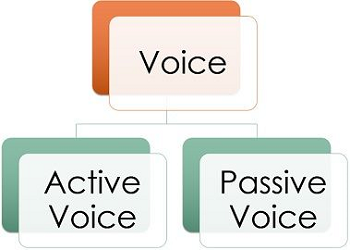
There are 2 types of voices:-
1) Active Voice
2) Passive Voice
वाच्य दो प्रकार के होते है:-
1) Active Voice (कर्ता वाच्य)
2) Passive Voice (कर्म वाच्य)
WHAT IS ACTIVE VOICE?
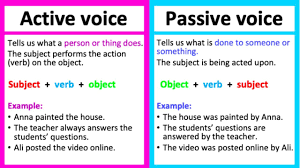
When the subject of the verb is doing the action of the verb, the verb is said to be in the active voice. The sentence where subject of the verb is more important for any sentence is called Active voice.
कर्ता वाच्य क्या होता है?
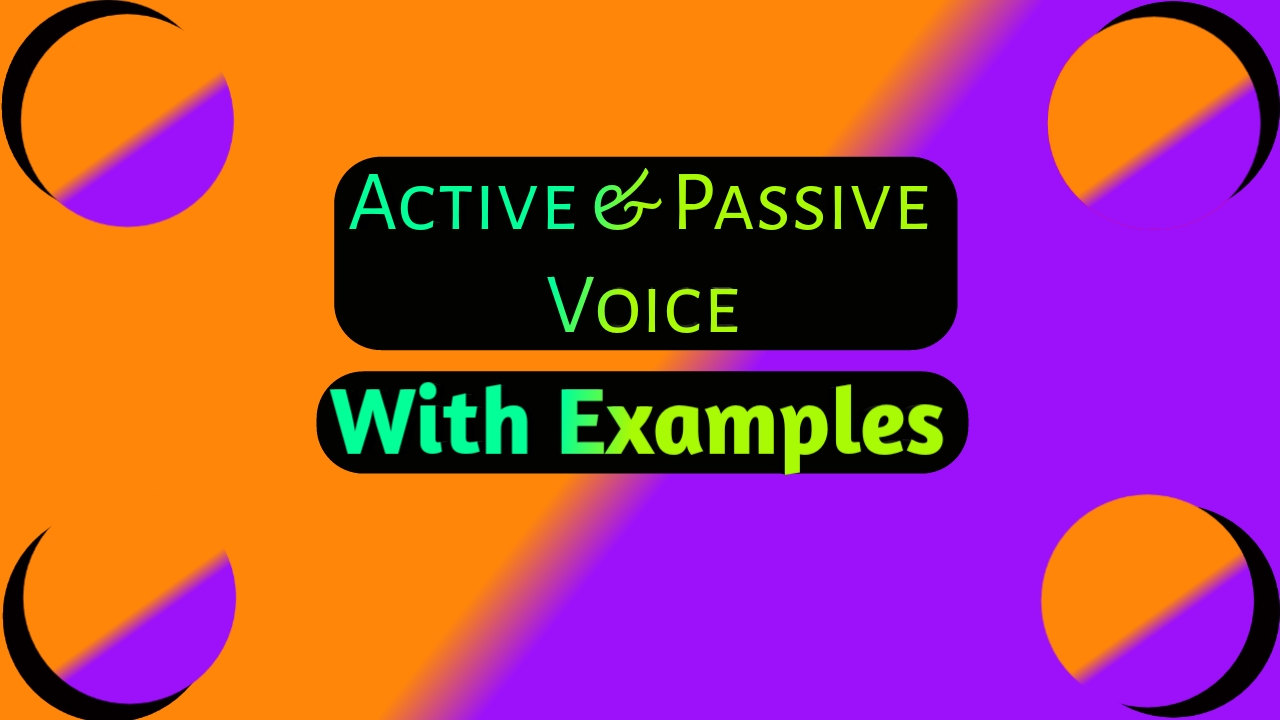
किसी क्रिया को कर्ता वाच्य तब कहा जाता है जब कोई व्यक्ति या वस्तु subject के रूप में कुछ काम करता है। वाक्य जिस स्थान पर subject (कर्ता) महत्वपूर्ण हैं उसे कर्ता वाच्य कहते है।
STRUCTURE OF ACTIVE VOICE
Subject + verb+ Object
EXAMPLES
1) I wrote a letter.
2) She is cooking food.
उदहारण:- 1) मैंने एक पत्र लिखा है।
2) वह खाना बना रही है।
Here in above Example मैंने (i), वह (she) is main Subject (कर्ता).
WHAT IS PASSIVE VOICE?
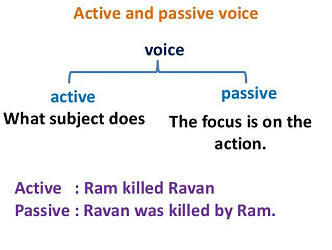
When the subject of the verb is being acted upon, the verb is said to be in the passive voice. The sentence where object of the verb is more important for any sentence is called Passive voice.
कर्म वाच्य क्या होता है?
किसी क्रिया को passive voice (कर्म वाच्य) तब कहा जाता है जब कोई व्यक्ति या वस्तु किसी subject के रूप में ना काम करके object के रूप में काम करता है। जिस स्थान पर Object (कर्म) महत्वपूर्ण हैं उसे कर्म वाच्य कहते है।
STRUCTURE OF PASSIVE VOICE
Passive Subject+ Helping Verb+ Main Verb (V3) + by+ Passive Object
EXAMPLES
1) The house is built by Ramesh.
2) The tiger is killed by the hunter.
उदहारण:- 1) घर रमेश द्वारा बनाया गया है।
2) बाघ शिकारी द्वारा मारा गया है।
Above Sentences मे कौन-सा कार्य हुआ है उस पर जोर है इसलिए Objects- घर, बाघ के अनुसार ही क्रिया है यानी ये ही कर्म थे जो अब कर्ता हैं।
RULES FOR CHANGING ACTIVE INTO PASSIVE VOICE
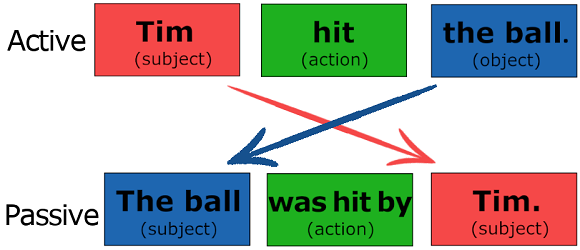
1) Subject becomes Object and Object becomes Subject.
2) Intransitive verbs cannot be converted into passive voice.
3) Verb will follow the new Subject.
4) A sentence written in Perfect Continuous Tense cannot be converted into passive voice.
5) 3rd form of the main verb will be used.
6) In Passive voice before object use 'by' (द्वारा).
NOTE:- There is no Passive Voice formation for Present Perfect Continuous Tense, Past Perfect Continuous Tense, Future Perfect Continuous Tense, Future Continuous Tense
कर्ता वाच्य को कर्म वाच्य में बदलने के नियम
1) Subject Object बन जाता है और Object Subject बन जाता है।
2) अकर्मक क्रिया (Intransitive verbs) को कभी भी कर्म वाच्य में नहीं बदला जाता है।
3) नए Subject के हिसाब से क्रिया (Verb) लगाई जाती है।
4) कोई भी वाक्य अगर Perfect Continuous Tense में लिखा गया है तो उसे कर्म वाच्य में बदला नहीं जाता है।
5) कर्म वाच्य में हमेशा main verb की 3rd form इस्तेमाल की जाती है।
6) कर्म वाच्य में object से पहले हमेशा 'by' (द्वारा) का इस्तेमाल होता है।
NOTE:- Present Perfect Continuous Tense, Past Perfect Continuous Tense, Future Perfect Continuous Tense, Future Continuous Tense में passive voice (कर्म वाच्य) नहीं बनाया जाता है।
CHANGE IN PRONOUNS
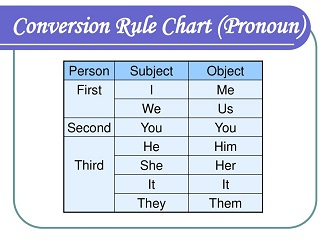
(I) RULES FOR CHANGING ACTIVE INTO PASSIVE VOICE IN PRESENT TENSE
(A) PRESENT INDEFINITE TENSE OR SIMPLE PRESENT TENSE:-
AFFIRMATIVE SENTENCES:-
For Example:- 1) A.V:- He sings a song.
P.V:- A song is sung by him.
NEGATIVE SENTENCES:-
For Example:- 1) A.V:- He does not study English.
P.V:- English is not studied by him.
INTERROGATIVE SENTENCES:-
For Example:- 1) A.V:- Do you play football?
P.V:- Is football played by you?
(B) PRESENT CONTINUOUS TENSE
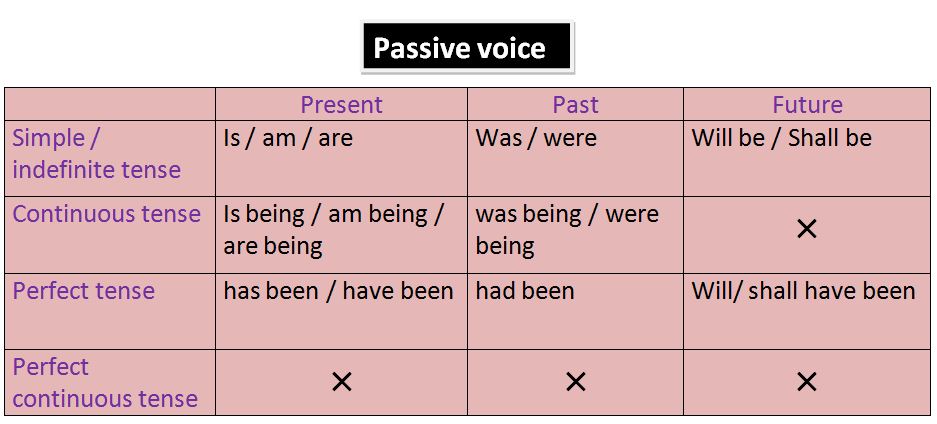
AFFIRMATIVE SENTENCES:-
For Example:- 1) A.V:- He is playing video game.
P.V:- Video game is being played by him.
NEGATIVE SENTENCES:-
For Example:-1) A.V:- He is not playing a video game.
P.V:- Video game is not being played by him.
INTERROGATIVE SENTENCES:-
For Example:-1) A.V:- Is she playing badminton?
P.V:- Is badminton being played by her?
(C) PRESENT PERFECT TENSE
AFFIRMATIVE SENTENCES:-
For Example:- 1) A.V:- She has written a letter.
P.V:- A letter has been written by her.
NEGATIVE SENTENCES:-
For Example:-1) A.V:- She has not written a letter.
P.V:-A letter has not been written by her.
INTERROGATIVE SENTENCES:-
For Example:- 1) A.V:- Has she written the letter?
P.V:- Has the letter been written by her?
(II) RULES FOR CHANGING ACTIVE INTO PASSIVE VOICE IN PAST TENSE
(A)PAST INDEFINITE TENSE OR SIMPLE PAST TENSE:-
AFFIRMATIVE SENTENCES:-
For Example:- 1) A.V:- He sang a song.
P.V:- A song was sung by him.
NEGATIVE SENTENCES:-
For Example:- 1) A.V:- He did not study English.
P.V:- English was not studied by him.
INTERROGATIVE SENTENCES:-
For Example:- 1) A.V:- Did you play football?
P.V:- Was football played by you?
(B) PAST CONTINUOUS TENSE
AFFIRMATIVE SENTENCES:-
For Example:- 1) A.V:- Nitika was painting the wall.
P.V:- The wall was being painted by Nitika.
NEGATIVE SENTENCES:-
For Example:-1) A.V:- Manish was not repairing the car.
P.V:- The car was not being repaired by Manish.
INTERROGATIVE SENTENCES:-
For Example:-1) A.V:-Were you reciting the poem?
P.V:-Was the poem being recited by you?
(C) PAST PERFECT TENSE
AFFIRMATIVE SENTENCES:-
For Example:- 1) A.V:- Misha had cleaned the floor.
P.V:- The floor had been cleaned by Misha.
NEGATIVE SENTENCES:-
For Example:-1) A.V:- Vidhi had not received the parcel.
P.V:- The parcel had not been received by Vidhi.
INTERROGATIVE SENTENCES:-
For Example:- 1) A.V:- Had they caught the thief?
P.V:- Had the thief been caught by them?
(III) RULES FOR CHANGING ACTIVE INTO PASSIVE VOICE IN FUTURE TENSE
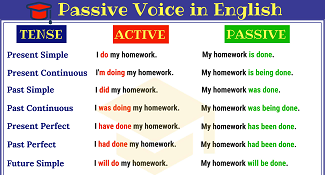
(A)FUTURE INDEFINITE TENSE OR SIMPLE FUTURE TENSE:-
AFFIRMATIVE SENTENCES:-
For Example:- 1) A.V:- Kriya will sew the bag.
P.V:- The bag will be sewed by Kriya.
NEGATIVE SENTENCES:-
For Example:- 1) A.V:- Disha will not arrange the things.
P.V:- The things will not be arranged by Disha.
INTERROGATIVE SENTENCES:-
For Example:- 1) A.V:- Will you mop the floor?
P.V:- Will the floor be mopped by you?
(B) FUTURE PERFECT TENSE
AFFIRMATIVE SENTENCES:-
For Example:- 1) A.V:- They will have brought the toy.
P.V:- The toy will have been brought by them.
NEGATIVE SENTENCES:-
For Example:-1) A.V:- Nimesh will have not changed the table cover.
P.V:- The table cover will have not been changed by Nimesh.
INTERROGATIVE SENTENCES:-
For Example:- 1) A.V:- Will she have written the notes?
P.V:- Will the notes have been written by her?
PRACTICE EXERCISES
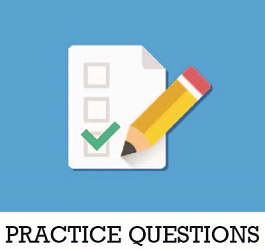
Q1. Change the active voice of following simple present tense into passive voice.
1) He opens the door.
2) We set the table.
3) She pays a lot of money.
4) I draw a picture.
5) They wear blue shoes.
6) They do not help you.
7) He does not open the book.
8) You do not write the letter.
9) Does your mom pick you up?
10) Does the police officer catch the thief?
Answer. 1) The door is opened by him.
2) The table is set by us.
3) A lot of money is paid by her.
4) A picture is drawn by me.
5) Blue shoes are worn by them.
6) You are not helped by them.
7) The book is not opened by him.
8) The letter is not written by you.
9) Are you picked up by your mom?
10) Is the thief caught by the police officer?
Q2. Change the active voice of following present continuous tense into passive voice.
1) Sheila is drinking a cup of tea.
2) My father is washing the car.
3) Farmer Joe is milking the cows.
4) She is taking a picture of him.
5) I am writing a poem.
6) We are not playing football.
7) He is not wearing a tie.
8) Is she preparing the party?
9) Are they talking about the meeting?
10) Is she watering the flowers?
Answer. 1) A cup of tea is being drunk by Sheila.
2) The car is being washed by my father.
3) The cows are being milked by farmer Joe.
4) A picture of him is being taken by her.
5) A poem is being written by me.
6) Football is not being played by us.
7) A tie is not being worn by him.
8) Is the party being prepared by her?
9) Is the meeting being talked about by them?
10) Are the flowers being watered by her?
Q3. Change the active voice of following present perfect tense into passive voice.
1) Kerrie has paid the bill.
2) I have eaten a hamburger.
3) We have cycled five miles.
4) I have opened the present.
5) They have not read the book.
6) You have not sent the parcel.
7) We have not agreed to this issue.
8) They have not caught the thieves.
9) Has she called him?
10) Have they noticed us?
Answer. 1) The bill has been paid by Kerrie.
2) A hamburger has been eaten by me.
3) Five miles have been cycled by us.
4) The present has been opened by me.
5) The book has not been read by them.
6) The parcel has not been sent by you.
7) This issue has not been agreed to by us.
8) The thieves have not been caught by them.
9) Has he been called by her?
10) Have we been noticed by them?
Q4. Change the active voice of following simple past tense into passive voice.
1) She sang a song.
2) Somebody hit me.
3) We stopped the bus.
4) A thief stole my car.
5) They did not let him go.
6) She did not win the prize.
7) They did not make their beds.
8) I did not tell them.
9) Did you tell them?
10) Did he send the letter?
Answer. 1) A song was sung by her.
2) I was hit by somebody.
3) The bus was stopped by us.
4) My car was stolen by a thief.
5) He was not let go by them.
6) The prize was not won by her.
7) Their beds were not made by them.
8) They were not told by me.
9) Were they told by you?
10) Was the letter sent by him?
Q5. Change the active voice of following past continuous tense into passive voice.
1) We were talking about Francis.
2) He was playing the guitar.
3) She was watching a film.
4) I was repairing their bikes.
5) They were not eating dinner.
6) We were not painting the gate.
7) You were not driving him home.
8) He was not feeding the dogs.
9) Was she reading these lines?
10) Were they carrying bags?
Answer. 1) Francis was being talked about by us.
2) The guitar was being played by him.
3) A film was being watched by her.
4) Their bikes were being repaired by me.
5) Dinner was not being eaten by them.
6) The gate was not being painted by us.
7) He was not being driven home by you.
8) The dogs were not being fed by him.
9) Were these lines being read by her?
10) Were bags being carried by them?
Q6. Change the active voice of following past perfect tense into passive voice.
1) I had worn blue shoes.
2) Joe had cleaned the tables.
3) We had lost the key.
4) They had started a fight.
5) I had been reading an article.
6) I had not closed the window.
7) They had not bought the paper.
8) She had not noticed me.
9) Had she solved the problem?
10) Had he recorded that song?
Answer. 1) Blue shoes had been worn by me.
2) The tables had been cleaned by Joe.
3) The key had been lost by us.
4) A fight had been started by them.
5) An article had been read by me.
6) The window had not been closed by me.
7) The paper had not been bought by them.
8) I had not been noticed by her.
9) Had the problem been solved by her?
10) Had that song been recorded by him?
Q7. Change the active voice of following simple future tense into passive voice.
1) Jane will buy a new computer.
2) Her friend will install it.
3) Millions of people will visit the museum.
4) Our boss will sign the contract.
5) You will not do it.
6) They will not show the new film.
7) He will not see Sue.
8) They will not ask him.
9) Will the company employ a new worker?
10) Will the plumber repair the shower?
Answer. 1) A new computer will be bought by Jane.
2) It will be installed by her friend.
3) The museum will be visited by millions of people.
4) The contract will be signed by our boss.
5) It will not be done by you.
6) The new film will not be shown by them.
7) Sue will not be seen by him.
8) He will not be asked by them.
9) Will a new worker be employed by the company?
10) Will the shower be repaired by the plumber?
Q8. Change the active voice of following future perfect tense into passive voice.
1) Frank will have ordered the drinks.
2) You will have spent all the money.
3) I will have taken the dog for a walk.
4) She will have sold the car.
5) They will have solved the problem.
6) She will have not read the book.
7) They will have not trusted him.
8) He will have not rung Barbara.
9) Will they have paid the bill?
10) Will you have washed my socks?
Answer. 1) The drinks will have been ordered by Frank.
2) All the money will have been spent by you.
3) The dog will have been taken for a walk by me.
4) The car will have been sold by her.
5) The problem will have been solved by them.
6) The book will have not been read by her.
7) He will have not been trusted by them.
8) Barbara will have not been rung by him.
9) Will the bill have been paid by them?
10) Will my socks have been washed by you?